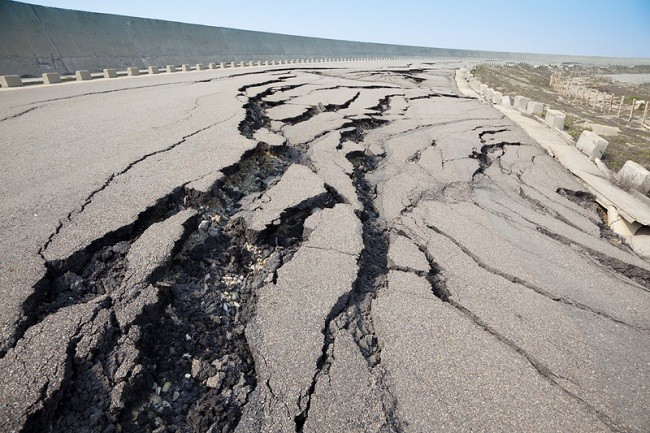While people who live in earthquake-prone areas may be used to the frequent tremors, nothing can fully prepare a person to suddenly be hit with a massive 9.0 quake that levels buildings and buries thousands of people. To learn the tricks you'll need to survive, check out the excerpt below.
This shifting of massive parts of the Earth is akin to violently shaking a table with items on it. Due to the intensity of some quakes, many buildings are simply shaken apart. Their collapse, resulting in subsequent fires and other dangers, claim lives by the scores. An average of 10,000 people a year die because of earthquakes around the world. The massive earthquake in Tohoku, Japan, in 2011 is still fresh in many people’s minds. The massive 9.0 earthquake and subsequent tsunami killed more than 18,000 people, destroyed many parts of northeast Japan, caused a meltdown at the Fukushima power plant and racked up over $220 billion in damage. Similarly devastating quakes in Haiti and Nepal have raised the recent death toll attributed to these natural disasters to staggering heights.
As is the case with any destructive natural phenomenon, the best we can do is prepare for the worst. If you live in an earthquake zone, you should make efforts to “quake prep” your home. This includes evaluating your home for potential dangers such as heavy shelves that can fall as well as bookcases and the like. You can secure these items with flexible fasteners, such as nylon straps, or with closed hooks, or by relocating them away from beds and seating, to lower shelves or to cabinets with latched doors. Ensure that plumbers have installed flexible connectors on all gas appliances.
Another constant in this setting is the need for a good emergency kit.A serious survival kit should include:
Water
Non-Perishable Food
Hand-Crank Radio
Flashlight
Extra Batteries
Emergency Charger
First-Aid Kit
Multi-Purpose Tool
Hygiene Kit
Essential Documents
Clothes
Cash
Stay where you are until the shaking stops. Do not run outside. Do not get in a doorway, as this does not provide protection from falling or flying objects, and you may not be able to remain standing. Instead, drop down onto your hands and knees so the earthquake doesn’t knock you down. Drop to the ground before the earthquake drops you.
Cover your head and neck with your arms to protect yourself from falling debris. If you are in danger from falling objects but can move safely, crawl for additional cover under a sturdy desk or table. If there is low furniture or an interior wall or corner nearby and the path is clear, these may also provide some additional cover. Stay away from glass, windows, outside doors and walls, and anything that could fall, such as light fixtures or furniture. Stay where you are until the shaking stops.
There will be a great deal of chaos and confusion following an earthquake. Once the shaking stops, leave the structure and move to an open space. Avoid going back into buildings because aftershocks are likely. If you are trapped in a building, take care to move around as little as possible. If you have a cell phone, you can call or text for help. If 911 circuits are down, then send a text or call someone. Relay your location and have them contact authorities for help. You should look for a pipe or other hard object that you can use to tap on a wall or floor. This can help alert rescue workers to your location.
Once you are free, it is important to be careful regarding your surroundings. Many times, city water will become contaminated and electrical lines may be down. There is also a chance of flooding and even tsunamis because of earthquakes. Check water, gas and electric lines for damage. If any are damaged, shut off the valves. Check for the smell of gas. If you smell it, open all the windows and doors, leave immediately and report it to the authorities. Stay aware and listen to emergency messages.
Having your emergency kit ready is pretty much the only guaranteed thing you can do to protect yourself from these extremely violent events. You can never predict where you'll be when this happens, and the safest place is outside, away from anything that can fall on top of you. Again, that's easier said than done. The best advice to pull from this is to keep your phone on you at all times so that you can call emergency services or your loved ones if you get buried.
You can learn more about this topic at Real World Survivor.
